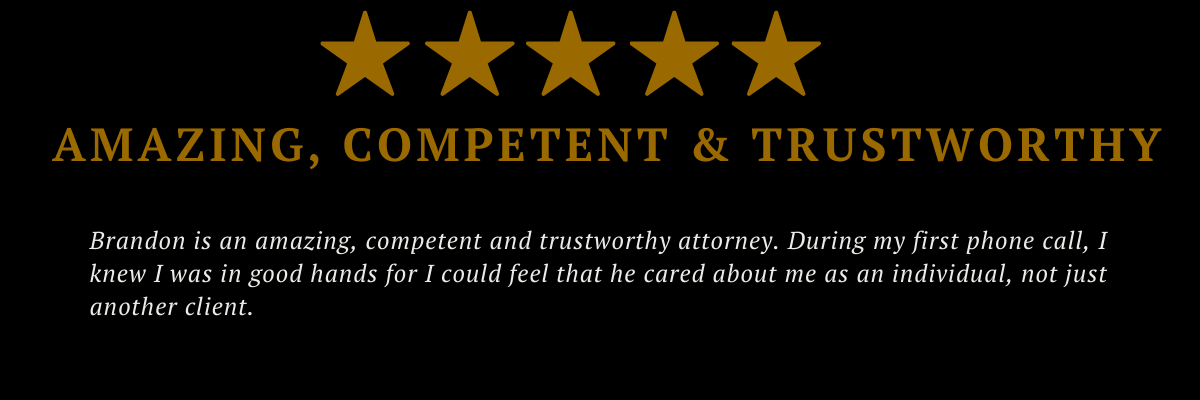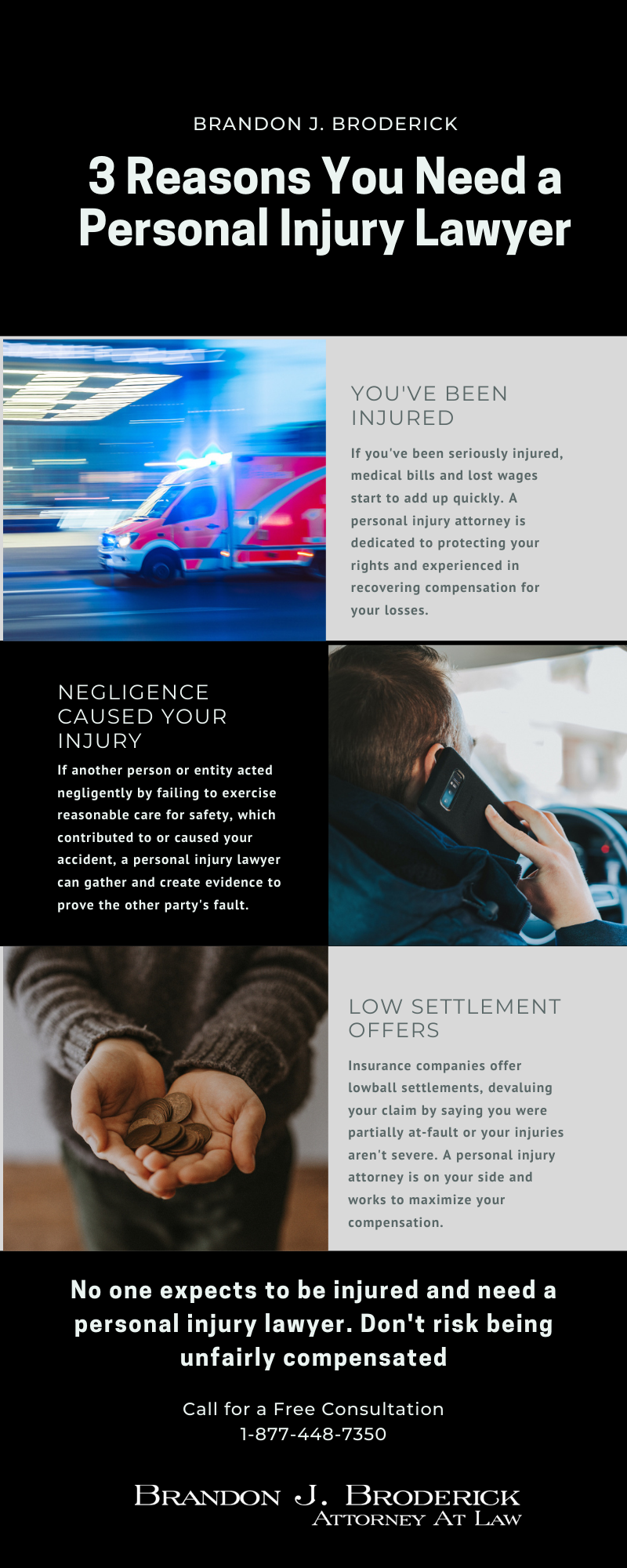Let the experienced personal injury lawyers of Brandon J. Broderick, Attorney at Law, help you turn a setback into a comeback. Our New Jersey injury lawyers have decades of experience in car crashes, truck accidents, ridesharing accidents, slip and fall cases, construction accidents, wrongful death, workers compensation and other aspects of personal injury law. When working is difficult or impossible, bills and medical expenses are mounting, and quality of life is diminished, you need to call the best New Jersey personal injury law firm, Brandon J. Broderick, Attorney at Law.
At Brandon J. Broderick, Attorney at Law, we believe in compassionate client care and an honest, straightforward approach. Our New Jersey personal injury attorneys are there with you to ensure you understand what is happening in your case as they build a deep level of trust and partnership throughout the process. To us, that means an experience free from legalese, hype, hassle, and intimidation. We are NOT like the others. That’s why our clients give us rave reviews and tell us we are the best personal injury lawyers in NJ.
When you hire a lawyer from our firm at Brandon J. Broderick, you pay nothing upfront. We work on contingent fees that are only collected if we win your case. That means if we don’t win, you don’t pay. Without a legal claim, the insurance company or responsible party can offer you a lowball settlement that barely covers any of your needs and may even refuse to cover some of the damages. You may be left having to pay for the costs of your injuries on your own. Contact us today and let us turn your setback into a comeback.
For a free legal consultation with a compassionate personal injury lawyer serving New Jersey, call (877) 448-7350
For a comprehensive overview of what personal injury is, what makes for a successful personal injury claim, and what your case may be worth, read on for our guide to personal injury claims.
What to Do If You've Been Injured
What is My Personal Injury Claim Worth?
Types of Compensation in Personal Injury Cases
Types of Personal Injury Cases
Statute of Limitations and Time Limits for Filing
Brandon J. Broderick, Attorney at Law, Is Here for You
3 Reasons to Call a Personal Injury Lawyer
What to Do Next If You’ve Been Injured
In the immediate aftermath of an accident, if you’re able, gather evidence at the scene. If you’ve been in a car accident, take pictures of the scene of the accident and your injuries. If you’ve fallen at a business, make sure to have the incident documented at the accident site. Don’t be afraid to insist on calling the police and seeking medical care.
Medical care after an injury is extremely important. If you don’t seek medical care, insurance companies and the potential at-fault party can more easily claim that you weren’t injured. Medical records serve as important evidence in personal injury cases, so it's important you seek them as soon as possible after the accident.
If you or a loved one has been seriously injured, if the injuries are permanent or permanently disabling, or if your loved one died, you should highly consider speaking with a personal injury lawyer in NJ. You may have the grounds for a personal injury claim, and an injury attorney can navigate the process and maximize your compensation. Personal injury lawyers will help you file your claim, equip you with the necessary information, and assign tasks that will help strengthen your case, such as seeking medical attention or keeping a diary of your injuries or limitations.
If you’ve been injured in an accident, don’t wait. Contact us today for a free consultation. With our proven track record of success and our commitment to client care, we can turn your setback into a comeback.

What Is My Personal Injury Claim Worth?
Personal injury claims include damages for tangible and intangible losses you experienced because of the incident. Typically, the more serious or permanent the injury, the higher the claim value. While each case is unique, the higher the value that you are seeking, the more complex the negotiation with the at-fault party becomes.
If you anticipate that further medical treatment will be necessary, such as with a serious injury, your claim will include compensation for future damages. If your medical treatment will extend far into the future, or you have lasting injuries that will require ongoing treatment, your claim could include a demand for compensation for future medical expenses, future pain and suffering and loss of enjoyment of life, or lost income. A personal injury lawyer has expertise in calculating and negotiating for the maximum amount of compensation in these complex areas.

Types of Compensation in Personal Injury
In a personal injury lawsuit, you are seeking compensation for your injuries from the person at fault or responsible for those injuries. The damages are the monetary amount you are seeking, which eventually gets agreed upon by you and your legal representative and the other parties involved in the negotiation of a settlement. If neither party can agree on an amount, it may then be decided by a judge or jury following a civil trial.
Damages can be put into one of two categories: compensatory damages and punitive damages. Compensatory damages are to compensate the injured party for losses incurred as a result of their injuries. Punitive damages are meant to punish the party responsible for the injuries and are typically reserved for the most egregious cases of negligence. When you speak to an injury lawyer, they will go over which of these is your best course of action.
Compensatory Damages
Compensatory damages are intended to bring the victim back to the same financial state as before the accident. Compensatory damages can include both tangible (economic) and intangible losses (non-economic).
Economic Damages
Economic damages have the potential to increase the amount of your claim. The amount for monetary damages varies from case to case and is determined by several losses that the plaintiff may have suffered due to their injury. Economic damages often include medical treatment, loss of income, loss of property and legal fees.
- Medical Treatment. Compensation for medical treatment includes the cost of hospital stays, doctors, rehabilitation, prescriptions, specialized therapies, medical devices, and transportation to and from appointments, along with any other expenses associated with the treatment of the injuries.
- Loss of Wages. You are entitled to compensation for any loss of wages due to your injury. Any income that you lost because of taking time off work should be included in your claim. If your injury prevents you from returning to the job that you are accustomed to doing, and you need to settle for a lesser position, then compensation for loss of wages should be claimed. Likewise, if you are unable to perform your job in the same capacity, you will need to account for any loss in pay you will suffer as a result.
- Loss of property. This would include compensation for vehicle damage or loss, personal items, or other items lost or damaged in the accident.
- Legal Fees. You are entitled to seek payment of your legal costs from the at-fault party. Most New Jersey personal injury attorneys work on a contingency basis, which means you do not owe legal fees until your case is resolved successfully. Your award can include the legal fees associated with your attorney’s time to bring the case to settlement.
Non-Economic Damages
Non-economic damages are awarded as compensation for a person's pain and suffering due to the injury. General damages, or general compensatory damages, are to compensate you for an injury that doesn’t cause a monetary loss. These damages may be difficult to prove, as they are not physical and usually cannot be seen.
Pain and suffering: Pain and suffering are subjective and depend on the person affected, the incident that occurred, and other factors. When you or your loved one is presenting your case for pain and suffering, you must detail the hindrance it has caused. An insurance company, judge, or jury will rely on various things when considering compensation. These include:
- Injury itself
- Recovery time
- Any permanent disability or limitations
Emotional suffering: In some instances, emotional suffering or anxiety warrants compensation. Emotional suffering is challenging to prove, so keeping a diary or calendar of good days and bad is essential. Be sure to include any mental anguish that you have suffered resulting from the incident.
Punitive Damages
You may not be entitled to punitive damages, as they are awarded due to clear defiance of the law or complete negligence or intent by the defendant. But if you feel you are a victim of a malicious or purposefully harmful act, you may be entitled to further compensation.
Cases that award punitive damages often involve a company or other large entity. For example, in a product liability case, a car parts manufacturer may continue to make and sell a car part they know to be unsafe or defective. If you can prove they were negligent in their decision to continue to sell the car part, they could be ordered to pay punitive damages. In some states or jurisdictions, punitive damages can also be awarded for violating anti-discrimination employment laws.
 5 Star Google Review
5 Star Google Review
What Types of Cases Do Personal Injury Lawyers in New Jersey Handle?
Personal injury law, also known as tort law, gives you the right to pursue compensation if you’ve been injured or your property has been damaged due to someone else’s negligence, recklessness, or intentional actions.
To succeed in a personal injury claim, you must prove that:
- The responsible party owed you a duty of care;
- That duty was breached through their actions or inaction;
- And their breach directly caused your injury or damages.
Personal injury law encompasses a wide range of injury cases, including
- Bicycle Accidents
- Burn Injuries
- Bus Accidents
- Car Accidents
- Construction Accidents
- Dog Bites
- Medical Malpractice
- Motorcycle Accidents
- Nursing Home Abuse
- Pedestrian Accidents
- Premises Liability
- Product Liability
- Slip and Fall Accidents
- Truck Accidents
- Uber & Rideshare Accidents
- Workers’ Compensation
- Wrongful Death
At Brandon J. Broderick, Attorney at Law, our experienced personal injury attorneys are committed to helping you recover the compensation you deserve. If you’ve been hurt, you may file a claim or lawsuit against the person or entity at fault. While many cases are resolved through settlement negotiations, we are always prepared to take your case to trial if necessary to pursue full and fair compensation. Get a Free Legal Review—Speak with our team today to learn your rights and next steps.
Types of Personal Injuries
Personal injury refers to both physical injury as well as the emotional pain and suffering caused by the accident, incident or illness. For instance, if you are injured in a car accident and suffer a traumatic brain injury, you are entitled to compensation for all costs associated with the treatment and recovery of your physical injuries as well as a monetary award for the pain and suffering you endured because of the injury. Personal injury refers to an umbrella of damages caused to the plaintiff by the defendant and are covered under the general terms:
- Bodily harm
- Pain and suffering
- Emotional distress
Bodily Harm
Actual bodily harm to your person is straightforward, usually involving a car accident or something of that nature, wherein the victim would seek compensation for their injuries. The amount sought after for personal bodily harm would help pay for medical bills, surgeries, physical therapy, care equipment at home, or anything else needed for rehabilitation resulting from the occurrence.
Pain and Suffering
Pain and suffering are not as straightforward as physical injury to the body. To effectively document your emotional pain and suffering, you may be directed to speak to a mental health professional. Speaking to a mental health professional may determine whether you have lingering psychological repercussions.
You will want to document how your pain and suffering have caused your enjoyment in day-to-day activities to decline and how you may no longer be able to participate in things you once enjoyed. Perhaps you or your loved one can no longer communicate, or you cannot enjoy outings as you once did; this would fall under that umbrella.
Emotional Distress
Emotional distress includes some of the more challenging-to-prove aspects, such as defamation of character or threats to your physical safety. Emotional distress is valid, and you deserve to fight for compensation to help you seek retribution for any fear or loathing you have endured.
If you suffered a serious injury because of an accident, it is important to know that you can and should reject any offer that doesn’t fairly compensate you for your losses.
Negligence in Personal Injury Cases
In New Jersey, the legal responsibility in an accident will usually come down to the negligence of the person at fault for the accident. One of the most difficult aspects of a personal injury case can be proving negligence or negligent acts were the cause of serious injuries and damages. In many cases, accidents are simply that—accidents. In other cases, such as a drunk driving accident, it can be easily established that the act of criminal negligence is what caused the accident and the person who should be held liable for the damages.
There are four elements, under New Jersey law, that go into proving the negligence of a personal injury claim:
- Legal Duty. Legal duty establishes that the defendant owed the victim a legal duty to keep that person relatively safe and free from harm. New Jersey drivers have a legal obligation and duty to other vehicles, cyclists, and pedestrians that they operate their vehicle safely. A business has a legal duty to maintain their premises in a safe manner, free from hazards like ice and snow or slippery floors.
- Breach of Duty. It must be proven that at the time of the accident, the defendant conducted themselves in a manner that they knew could potentially harm others. In addition, it must be proven that another person in the same circumstance would have acted differently in the same situation. For example, a person would know that driving under the influence is likely to cause an incident.
- Causation. You will need to prove that your injuries result from a breach of duty on the part of the other party. Simply put, this means that you must verify that your injuries are the result of the defendant’s conduct. Seek your physician’s medical attention to establish an injury was caused or an existing injury worsened due to the defendant's negligence. Documenting your injuries with a doctor is critical. It is difficult to collect compensation for injuries that were not documented by a physician.
- Damages. Finally, in order to file a claim, you must have suffered some type of loss. Your loss, or damages, can include compensation for medical bills, lost wages, and pain and suffering.
Comparative Negligence
Your settlement amount may be affected if you are partially liable for the damages incurred. Comparative fault is considered in all states and will be considered when it comes to settlement amounts if the insurance company finds that you were partially at fault in the incident. In New Jersey, the insurance company investigates how much each person contributed to the accident, if at all.
The Comparative Negligence Act states that an insurance carrier may determine liability based on the relative fault of the individuals involved. Once the insurance company does an independent review of the accident, conditions and factors at the time of the incident, they will determine a percentage of liability for each party involved.
For instance, in a car accident, when considering fault, an insurance company looks into:
- Whether the driver was under the influence of a substance
- If traffic violations were a factor
- Negligent driving or undue care
- Whether the brakes were applied
- Speed of the vehicles
- If effort was made to avoid a collision
In New Jersey, the sum of damages you receive is reduced by your fault percentage. For example, if you were considered 20% at fault for the accident and your claim was $10,000, you might receive $8000 from the insurance company representing the other driver, but the remaining $2000 would be paid under your insurance company.
Don't wait. We’ve helped people just like you move forward after sustaining an injury. Contact us now at (877)448-7350
Statute of Limitations on Filing a Claim
The statute of limitations on a personal injury claim, according to the New Jersey Statute Section 2A:14-2, is as follows:
“Every action at law for an injury to the person caused by the wrongful act, neglect or default of any person within the State shall be commenced within two years next after the cause of any such action shall have accrued.”
In layman's terms, this means that there is a two-year window for filing a personal injury claim or lawsuit. If you do not file a claim before the statute of limitations expires, your window is typically expired. If you try to file a claim after the two-year deadline, the defendant will most likely file a motion to dismiss. There are only rare occasions when a personal injury claim may be filed beyond the two-year mark.
Notice of Claim Against Public Entities
If you’ve suffered injuries because of a state government or entity, a notice of claim within 90 days is required to inform the State of New Jersey that you plan to file a lawsuit to collect for damages that they incurred. It is intended to do what the name implies, and that is to let the government know you intend to file a claim.
A notice of claim is not the same as the actual lawsuit itself. The notice of claim is merely letting the other party know that you have filed a suit against them. In New Jersey, you must file the notice of claim within 90 days of the incident if the incident involves a public entity.
Personal Injury Lawyer FAQ
How long do I have to file a personal injury claim in New Jersey?
The statute of limitations for a personal injury claim in New Jersey is two years from the incident or occasion of injury. It is very difficult to file a claim after this window has passed. Also note that if your personal injury claim is against a New Jersey public entity, a notice of claim within 90 days is required.
When should I contact a personal injury lawyer?
It’s best to contact a personal injury lawyer as soon as possible after the incident or injury. They can advise you of your options and guide you on ways to gather evidence and record your immediate memories after the accident. It's never too late, however, to contact a personal injury attorney to discuss your case. Most offer free consultations.
Can I file a claim even if I have a pre-existing condition?
If you’ve been injured by someone else’s negligence, regardless of pre-existing injuries, it's important to know that you can still recover damages like lost wages, medical expenses caused by the accident. You don’t have to accept a lowball offer from an insurance company. An experienced personal injury attorney can negotiate and prove your case to the insurance company and/or file a claim against the responsible party.
How much is my personal injury case worth?
This is a common question we hear, but not a very easy one to answer. All cases are unique, and the value of your claim will depend on the facts and circumstances involved. We help our clients pursue the maximum compensation possible for all damages resulting from their accident or illness.
How long does it take to resolve a personal injury claim?
There are numerous factors that will play into the determination of how long your case will take. The severity of your injuries, the availability of evidence, how many parties may be liable, and your own patience and perseverance will determine how long it takes to resolve a claim. Our goal is to maximize compensation as efficiently as possible.
How much should I ask for in a personal injury settlement?
A personal injury settlement can consist of economic and non-economic damages. Economic damages would be the total medical bills, lost wages, future medical bills and future lost wages. Non-economic damages, like pain and suffering, are harder to calculate without the expertise of a personal injury lawyer. Carefully consider the extent and severity of your injuries before settling a personal injury claim.

Brandon J. Broderick is Here for You 24/7
We get it. No one expects to get into an accident, much less consider filing a personal injury lawsuit. But unexpected accidents can have an impact on your health, well-being, and finances, which can cause worry, fear, and anxiety—for you and your family. If you’ve been injured due to someone else’s negligence or reckless conduct, you have the right to seek compensation for your injuries and what you’ve suffered. Why get stuck dealing with insurance companies and negotiation all on your own?
At Brandon J. Broderick, Attorney at Law, we believe in exceptional client care, empathy, and results. That’s what makes us one of the best personal injury law firms in New Jersey. With our long track record of success, you can count on us to take the best strategy and work tirelessly for your quality of life. Our attorneys have decades of experience representing victims in all aspects of personal injury, from car crashes to slip-and-fall incidents to workplace accidents. We’ve helped people just like you move forward after sustaining an injury that was caused by another’s negligence or reckless conduct. Contact us today for a free consultation.
We have offices in Trenton, NJ; Ewing, NJ; Jersey City, NJ; and River Edge, NJ. We will come to you anywhere in the state. Turn your setback into a comeback. We can help.
3 Reasons You Need a Personal Injury Attorney
No one expects to get into an accident and need a personal injury lawyer, though having an experienced attorney by your side can make all the difference in the world in the outcome of your case.
